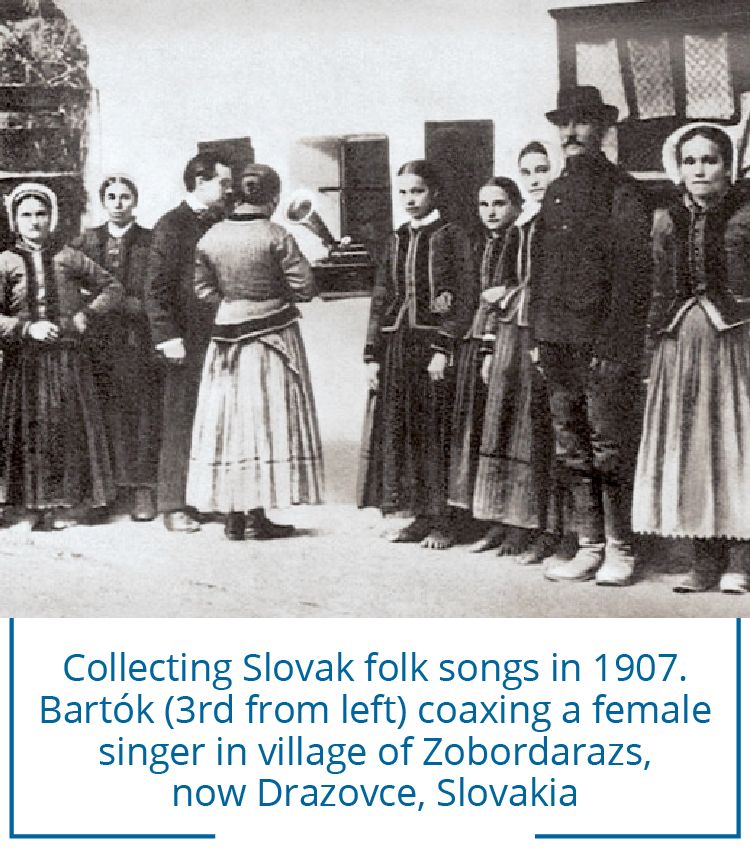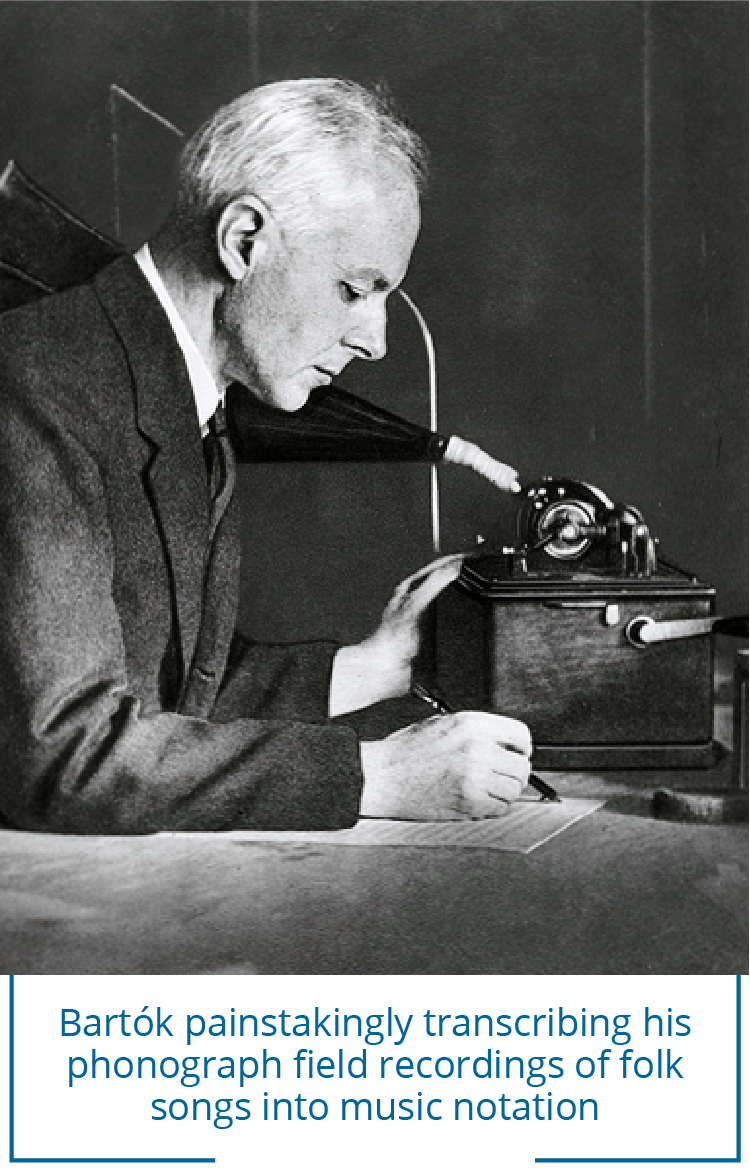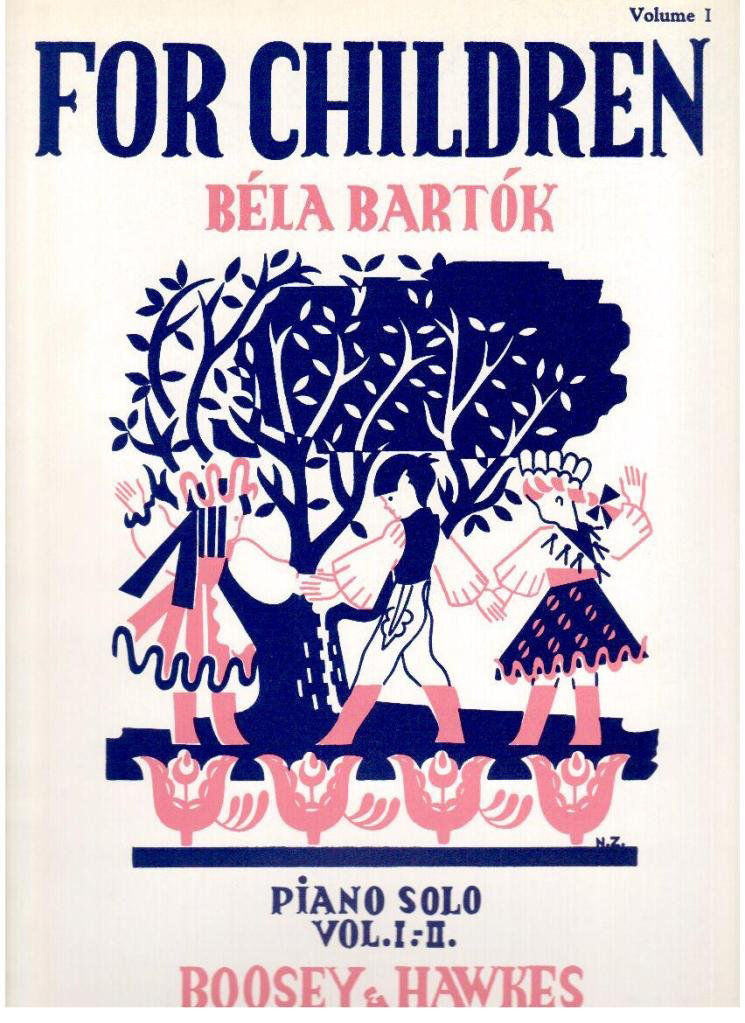EXCERPTS FROM FOR CHILDREN, Sz. 42
Béla Bartók
(b. Nagyszentmiklós, Hungary [now Sînnicolau Mare, Romania], March 25, 1881; d. New York, September 26, 1945), arr. Leo Weiner)
Composed 1908-9, rev. 1943 / 1952
AND TRADITIONAL LULLABIES
arr. Alex Fortes
- For Children, I. Andante grazioso
- For Children, II. Vivace
- Arrorró: traditional lullaby (Berber / Canary Islands / Latin America)
- For Children, IV. Allegro robusto
- For Children, III. Moderato sostenuto
- My Darling Isabelle, by Emily Irons
- For Children, V. Allegretto
- For Children, VI. Kánon: Vivace risoluto
- Nen nen korori: traditional Japanese (Edo region)
- For Children, VIII. Allegro giocoso

“The right type of peasant music is most varied and perfect in its forms. Its expressive power is amazing, and at the same time it is void of all sentimentality and superfluous ornaments. It is simple, sometimes primitive . . . and a composer in search of new ways cannot be led by a better master.”
Béla Bartók
Besides his work as a composer and cataloguer of folksongs, Bartók was a remarkable pianist and educator. It was his experience as a teacher that inspired him to write music for beginners: For Children (1908-11) and Mikrokosmos (1932-39). After relocating permanently to the United States in 1940 to escape the Second World War, Bartók reissued his music in American editions. He reflected on For Children around that time:
Already at the very beginning of my career as a composer I had the idea of writing some easy works for piano students. This idea originated in my experience as a piano teacher; I had always the feeling that the available material, especially for beginners, has no real musical value, with the exception of very few works—for instance, Bach’s easiest pieces and Schumann’s Jugendalbum. I thought these works to be insufficient, and so, more than 30 years ago, I tried to write some easy piano pieces. At that time the best thing to do would be to use folk tunes. Folk melodies, in general, have great musical value.
 So great was their musical value that Bartók would sometimes perform selections from For Children in his concert programs, including a radio broadcast in 1945, one of his final public appearances.
So great was their musical value that Bartók would sometimes perform selections from For Children in his concert programs, including a radio broadcast in 1945, one of his final public appearances.
Interspersed with For Children on this program are three lullabies, which are an essential sub-type of folk tune. Melodies are passed down from generation to generation by heart, becoming both part of a large collective memory and a very personal remembrance. It is these memories in musical form that bind us together as humans across time and culture.
A prime illustration of this cross-cultural occurrence is Arrorró mi niño (Hush, my child). Alex Fortes, who arranged this tune, notes:
As I was thinking of lullabies that had been sung to me as a kid, I remembered one that started with the words ’Arrurrú’ or ’Arrorró,’ as did my sister, but neither of us could remember the exact tune or the exact words. It was a very blurry memory. I did research trying to figure out what song this could possibly be and I found many different variations on this tune, most of which were extremely familiar. I think many of these versions were sung to me by my family from Mexico, Colombia, Spain and the Canary Islands, as well as close family friends from El Salvador, Venezuela, Argentina and other parts of Latin America. I found an article by a musical historian theorizing that Arrorró originated among North African Berbers, became popular in Spain and the Canary Islands a thousand years ago, and then found its way to Spanish colonies across the Americas, where each continued to evolve with local melodies and lyrics. My arrangement tries to get many of these cousin lullabies talking to each other in a mini-quodlibet.
 Emily and Jesse Irons note of their family’s uniquely personalized lullaby: “My Darling Isabelle is a classic please-go-to-sleep lullaby, one of dozens improvised in the first year of our daughter’s life. We didn’t initially understand when Isabelle started requesting that we ’sing Isabelle,’ but once we figured it out we knew we had a keeper.”
Emily and Jesse Irons note of their family’s uniquely personalized lullaby: “My Darling Isabelle is a classic please-go-to-sleep lullaby, one of dozens improvised in the first year of our daughter’s life. We didn’t initially understand when Isabelle started requesting that we ’sing Isabelle,’ but once we figured it out we knew we had a keeper.”
Finally, Nen nen korori (Hush/sleep baby) is also known as the Edo Lullaby, the former name of modern-day Tokyo. Given its nickname, the written version of the song likely came from the Edo period (17th–19th centuries). This third and final lullaby was programmed at the suggestion of A Far Cry violinist Megumi Stohs Lewis, who describes her personal connection to the song:
My great-grandmother in Japan, Bahchan, sang Nen Nen Korori to my mom when she would spend the summers at Bahchan’s house in a small village in the mountains. My mother sang it to me and I sing it to my daughter and son now. I loved feeling my mom’s hand smoothing my hair back while she sang it and hearing it always brings a sense of comfort and safety for me.